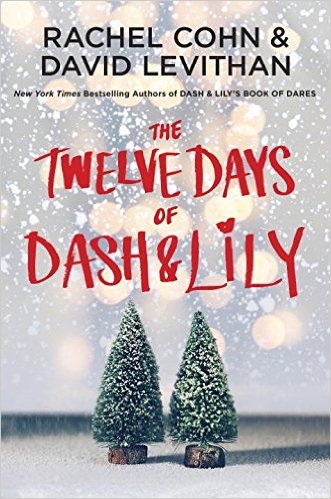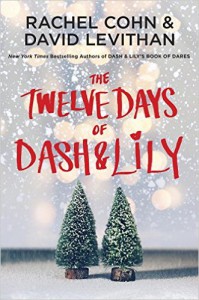Twelve Reasons to Read (and Enjoy)
The Twelve Days of Dash and Lily
Rachel Cohn’s and David Levithan’s novel
- Is a “mittens and hot chocolate and snow angels that lifted from the ground and danced in the air” (3) romance, until it’s not.
- Confirms that some people together are toxic.
- Shares multiple definitions of love, including a piece of exquisite pattern prose on pages 28-29, and explores the paradox: “The people you know the most, the people you love the most—you’re also going to feel the parts of them you don’t know the most” (80).
- Shows why “trying too hard plus good intentions does not necessarily equal happy fairy-tale endings” (53) and how most relationships wax and wane like the moon, shifting and changing to match the ebb and flow of life.
- Defines how “fudging suck” everything is when a person is depressed and how “to get around that [we need] to step out of reality from time to time and find something a little more enjoyable. . . because there is a messed-up kind of beauty in the way we can all bend over backward to make life seem magical when we want to” (145-146).
- Celebrates thinking and philosophical truths like “by pretending, we find out more about who we really are” (146) and “A party, like the human body, will fall into rigor mortis without proper circulation (199). It’s also a book in which a blink of an eye takes on medical, metaphorical, and metaphysical meaning.
- States that saying ‘I love you’ doesn’t really define a relationship; “it’s the actions, not the words” (121).
- Puts Lily at a crossroads where she must decide whether she will take charge of her feelings and her actions, even if the outcome might hurt, or whether she will allow herself to be unhappy simply because she won’t ask for what she wants.
- Explains that “If something is pretend (like Santa Claus), that usually means someone [who loves and cares for you] has taken the time to build a story for you to live in. And building stories takes a lot of work” (143).
- Features ginger people, not gingerbread men, because Dash believes it’s strange to gender cookies.
- Reveals how silence can communicate a truce, a default void, or concentration and focus.
- Discloses that Christmas is shit when darkened by accidents, hospitalization, and librarians unshelved in an ice skating mishap. It also identifies that many things in life are beyond our control, like time and the actions of other people. It is further beyond our control to change people or to make everyone healthy or always in love. So, we endure life for all its bittersweet glory.
- Posted by Donna


